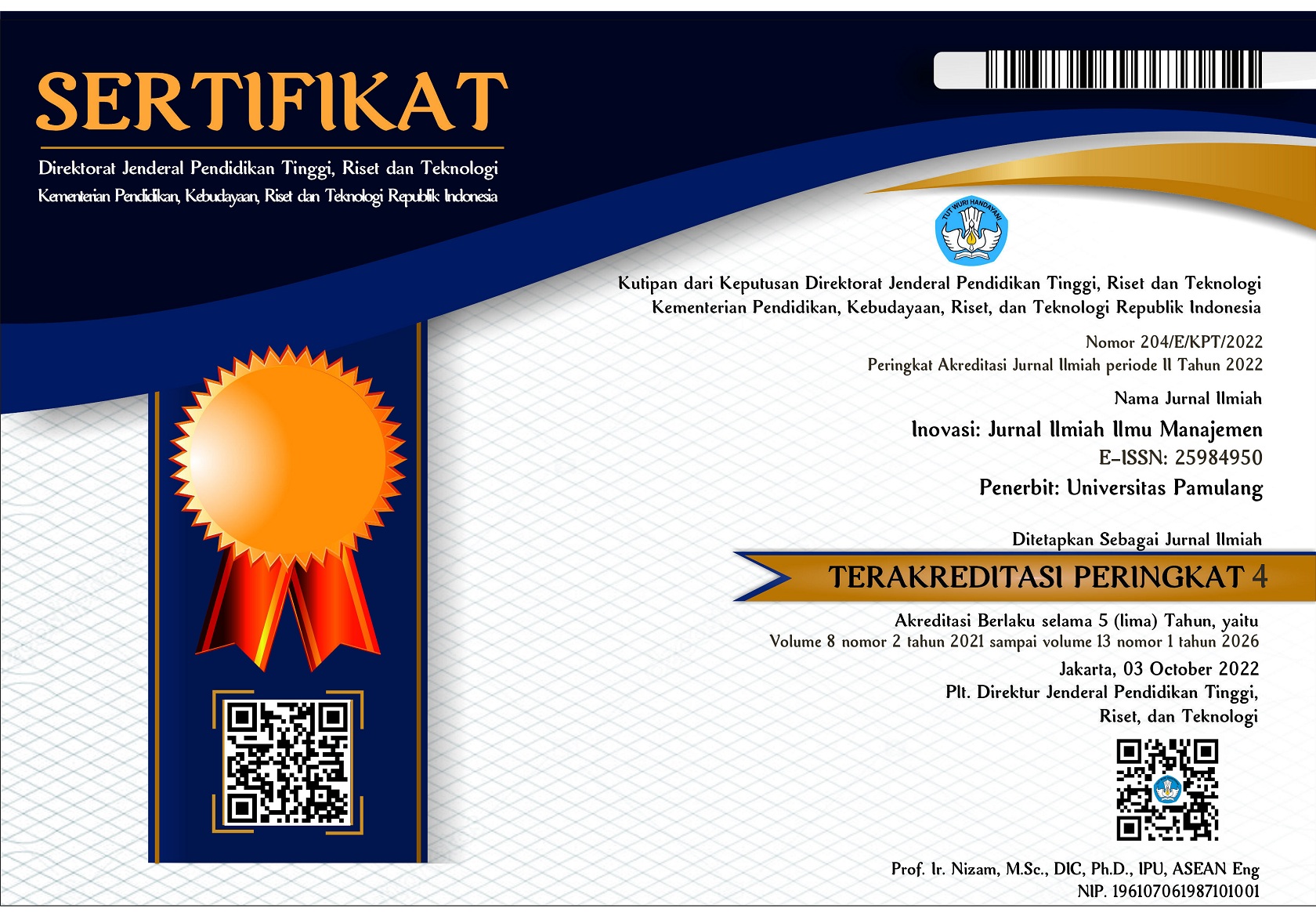PENTINGNYA MEMBANGUN KOMITMEN KERJA SEBAGAI UPAYA MENINGKATKAN KINERJA MELALUI PENINGKATAN MOTIVASI, LINGKUNGAN, DAN KOMPENSASI
DOI:
https://doi.org/10.32493/Inovasi.v8i1.p10-20.11489Abstract
This study aims to analyze and prove the effect of compensation, work discipline and work environment on work motivation, both partially and jointly, and the effect of compensation, work discipline, work environment and work motivation on organizational commitment, both partially and collectively. The research method used in this research is descriptive survey method and explanatory survey with a population of 1,339 employees and a sample size of 224 respondents, and the data analysis method used is SEM (Structural Equation Modeling). Based on the results of the study, then obtained the findings of structure I, compensation and work environment is partially significant effect on work motivation, while labor discipline no significant effect, but together all exogenous positive and significant effect on work motivation with the value of the contribution (R2) by 50%. Partially, the compensation variable has the most dominant influence on work motivation. In the second structure, compensation, work discipline, work environment and work motivation partially and jointly positive and significant impact on faculty commitment to the value of the contribution (R2)equal to 76%. Partially, the compensation variable has the most dominant influence on lecturer commitment. The work motivation plays a role as partial mediating, where the increase in lecturer commitment is influenced by compensation and the work environment is mediated by work motivation. Meanwhile, work discipline can have a direct effect on lecturer commitment even though they are not motivated.References
Harras, H., Sugiarti, E., & Wahyudi, W. (2020). Kajian Manajemen Sumber Daya Manusia Untuk Mahasiswa.
Wahyu, W., & Salam, R. (2020). KOMITMEN ORGANISASI (Kajian: Manajemen Sumber Daya Manusia).
Wahyudi, M. (2019). PENGARUH DISIPLIN DAN MOTIVASI TERHADAP KINERJA KARYAWAN. SCIENTIFIC JOURNAL OF REFLECTION: Economic, Accounting, Management and Business, 2(3), 351-360.
PAAIS, M., & PATTIRUHU, J. R. (2020). Effect of motivation, leadership, and organizational culture on satisfaction and employee performance. The Journal of Asian Finance, Economics, and Business, 7(8), 577-588.
Cecchini, J. A., Fernandez-Rio, J., Mendez-Gimenez, A., Gonzalez, C., Sanchez-MartÃnez, B., & Carriedo, A. (2020). High versus low-structured cooperative learning. Effects on prospective teachers’ regulation dominance, motivation, content knowledge and responsibility. European Journal of Teacher Education, 1-16.
Wahyudi, W. (2018). The Influence Of Job Satisfaction And Work Experience On Lecturer Performance Of Pamulang University. SCIENTIFIC JOURNAL OF REFLECTION: Economic, Accounting, Management and Business, 1(2), 221-230.
Sugiarti, E. (2018). Building Work Commitment of Bppt Employee. SCIENTIFIC JOURNAL OF REFLECTION: Economic, Accounting, Management and Business, 1(2), 171-180.
Mukrodi, M. (2018). The Commitment Analysis Of Religion Ministry In Banten Province. SCIENTIFIC JOURNAL OF REFLECTION: Economic, Accounting, Management and Business, 1(2), 161-170.
Jabbar, M. N., Hussin, F., Hashmi, M. A., & Jafri, S. M. I. (2020). Effect of Administrative Practices on Job Performance: An Empirical Study among Public University Employees in Pakistan. Global Academic Journal of Economics and Business, 1(1), 1-4.
Mukrodi, M. (2019). Membangun Motivasis Kerja. SCIENTIFIC JOURNAL OF REFLECTION: Economic, Accounting, Management and Business, 2(4), 431-440.
Smith, D., & Rhiney, E. (2020). CSR commitments, perceptions of hypocrisy, and recovery. International Journal of Corporate Social Responsibility, 5(1), 1-12.
Joarder, M. H. R., & Ashraf, A. (2020). Quality Education from Faculty Management Perspectives in Private Higher Education: Does Faculty Commitment Behaviour Mediate?. International Journal of Education and Practice, 8(1), 190-206.
Saridakis, G., Lai, Y., Muñoz Torres, R. I., & Gourlay, S. (2020). Exploring the relationship between job satisfaction and organizational commitment: an instrumental variable approach. The International Journal of Human Resource Management, 31(13), 1739-1769.
Fajri, C., Rahman, Y. T., & Wahyudi, W. (2021). MEMBANGUN KINERJA MELALUI LINGKUNGAN KONDUSIF, PEMBERIAN MOTIVASI DAN PROPORSIONAL BEBAN KERJA. SCIENTIFIC JOURNAL OF REFLECTION: Economic, Accounting, Management and Business, 4(1), 211-220.
Park, S., & Doo, M. Y. (2020). The effect of organizational culture and HR practices on female managers’ commitment and job satisfaction. European Journal of Training and Development.
Bai, Z., Luo, S., Zhang, L., Wu, S., & Chi, I. (2020). Acceptance and commitment therapy (ACT) to reduce depression: A systematic review and meta-analysis. Journal of Affective Disorders, 260, 728-737.
Wahyudi, W. (2018). The Influence of Emotional Intelligence, Competence and Work Environment on Teacher Performance of SMP Kemala Bhayangkari Jakarta. SCIENTIFIC JOURNAL OF REFLECTION: Economic, Accounting, Management and Business, 1(2), 211-220.
Khalid, K. (2020). The Impact of Managerial Support on the Association Between Pay Satisfaction, Continuance and Affective Commitment, and Employee Task Performance. SAGE Open, 10(1), 2158244020914591.
Downloads
Published
How to Cite
Issue
Section
License
Authors who publish with this journal agree to the following terms:
- Authors retain copyright and grant the journal right of first publication with the work simultaneously licensed under a Creative Commons Attribution License that allows others to share the work with an acknowledgement of the work's authorship and initial publication in this journal.
- Authors are able to enter into separate, additional contractual arrangements for the non-exclusive distribution of the journal's published version of the work (e.g., post it to an institutional repository or publish it in a book), with an acknowledgement of its initial publication in this journal.
- Authors are permitted and encouraged to post their work online (e.g., in institutional repositories or on their website) prior to and during the submission process, as it can lead to productive exchanges, as well as earlier and greater citation of published work (See The Effect of Open Access).
INOVASI: journal of managenet have CC-BY-SA or an equivalent license as the optimal license for the publication, distribution, use, and reuse of scholarly work.
In developing strategy and setting priorities, INOVASI: JOURNAL OF MANAGEMENT recognize that free access is better than priced access, libre access is better than free access, and libre under CC-BY-SA or the equivalent is better than libre under more restrictive open licenses. We should achieve what we can when we can. We should not delay achieving free in order to achieve libre, and we should not stop with free when we can achieve libre.









